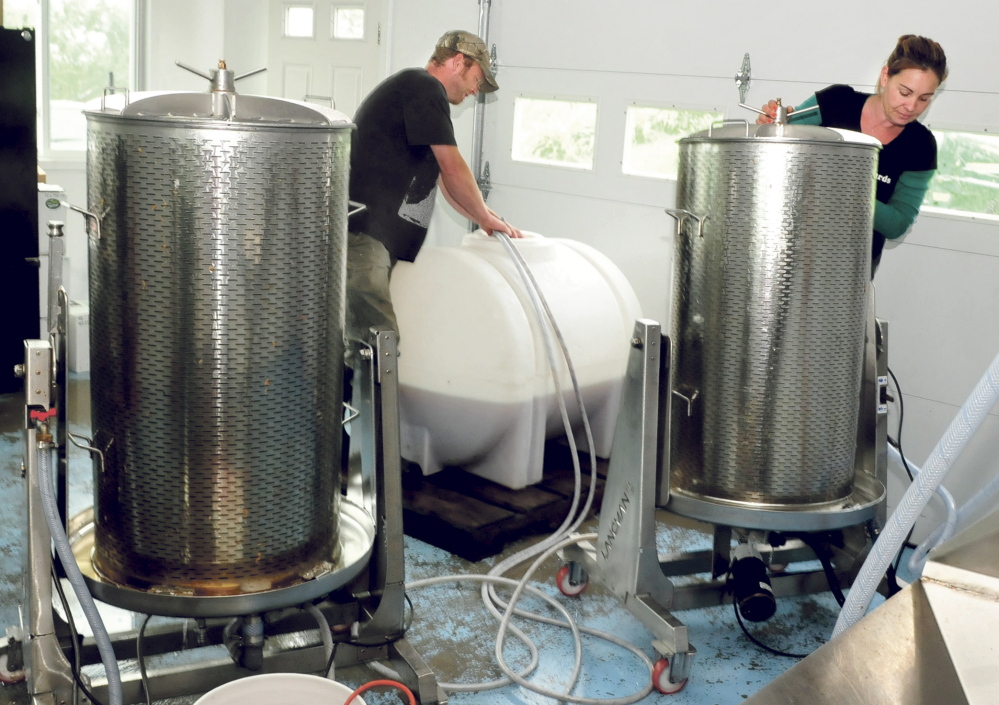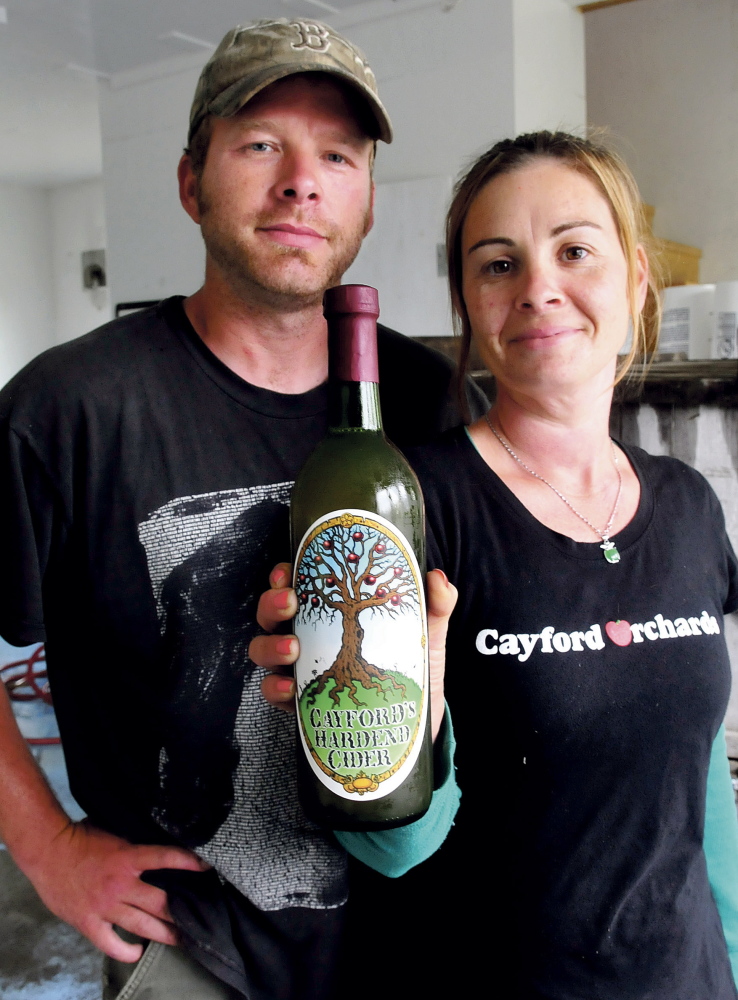BY DOUG HARLOW
Staff Writer
SKOWHEGAN — The long days of early summer round out the circle of life on the farm for Jason and Heather Davis, of Cayford Orchards.
These are the final days of the season, which began in September and October with crisp apples for baking and eating, sweet apple cider, new Cayford’s Hardened Cider and apple cider vinegar; and it ends with a final pressing of the last of the apples for one final product — apple syrup.
Now it all starts over again.
“This is the last of 6,000 bushels of apples,” Jason Davis, 39, said while making syrup in the cider house on a recent morning. “We sold them all. Nothing goes to waste. You turn your waste into more money. That’s why we got into hard cider, apple syrup, and why we’re going into the vinegar business.”
Cayford Orchards is a sixth-generation business, now producing 100 varieties of apples from 1,200 trees on 18 acres of land on Hilton Hill, a long, dead-end road in Skowhegan and Cornville.
The Davises took 78 varieties of apple to the Skowhegan State Fair last August and received 51 first prizes. The rest were second place against four other orchards, Jason said. They also grow blueberries, raspberries, peaches and plums.
Summer work in the orchard means mowing between the apple trees, hand-thinning the apples, tending to gardens and selling products at the Skowhegan Farmers’ Market. It also means canning and preserving the fruits of the harvest.
In a few more weeks, they will start picking blueberries twice a week for market, along with finishing odd jobs to get everything ready for the opening of their shop Sept. 1, Heather said. It’s the end and the beginning of the season all at the same time.
“In the fall, what happens is we sell all these pickles, dilly beans, jams and jellies I’ve worked on canning all summer. We also sell (Crooked Face Creamery of Skowhegan) cheese, and we sell pumpkins and squash and apples and sweet cider and Martha crab apples, and now we’ll be adding the hard cider,” said Heather Davis, 33. “And hopefully, vinegar by this fall, too.”
Production of Cayford’s Hardened Cider began in March. When it is bottled, the cider is roughly 7 percent alcohol by volume; but by the time it “conditions off,” the alcohol content is closer to 10 percent.
“It’s a pure product. There’s nothing in it but our apples, with no sulphates,” Heather said.
Sarah Smith, business manager at the The Pickup CSA — a community supported agriculture program in Skowhegan — said Cayford’s has become a mainstay for the weekly farm shares the program offers and for the attached restaurant.
“They’re super-valuable. They are our primary hard fruit grower for the CSA,” said Smith, of Grasslands Farm in Skowhegan. “We get almost all of our apples from them, pears, peaches, nectarines when we can get them. Their sweet cider we include in CSA, but their hard cider is available at the restaurant, too.”
The restaurant is the The Pick Up Cafe, which operates in the remodeled former parking garage of the 1865 Somerset County Jail, now home to the Somerset Grist Mill.
“The hard cider is very popular,” cafe manager Rosa Rosario said. “We also sell their regular cider, which they have until June, usually, and that’s really nice that we can get fresh cider. The restaurant uses a lot of their apples, and their peaches are the best peaches I’ve had in New England by far. They have really good plums and berries. They are so valuable to us for fruit production. We couldn’t do without them.”
Heather Davis said there is a demand for the farm’s hard cider. But with only a limited supply so far, the hard cider stays local — for now.
“I really want to — at least for the first year — keep it in Skowhegan,” she said of the hardened cider. “You want it; you come here for it. We just want it to add to everything else we are doing. It’s almost like the circle of life. We make sweet cider. You take extra sweet cider, you turn it into hard cider. A bad batch of hard cider, and you take that and your turn it into vinegar. Now the circle is complete. Waste not, want not.”
She said she still has some of her Cayford’s Hardened Cider in the cider house this summer — even as shops and restaurants are clamoring to order more.
“I’m hoarding it,” she said. “I’m done fermenting, but we’ll be able to sell it here at our shop when we open in September.”
Cayford’s also supplies local district schools with apples and sweet cider for the Healthy Kid Pack Program sponsored by New Balance Athletic Shoe and supply the Pickup Cafe and community supported agriculture program with apples, along with Barrels Market in Waterville.
For the Davises, farming is a full-time job. Neither of them works off the farm.
“We work hard, but I’m here to get my kids on the bus every morning. I’m here to take them off. I get to do what we love every day,” Heather said. “I started here as a sophomore in high school, when he started working this farm. I started picking drops on this farm.”
Even their three children are named after the apples — Cortlynn, 17, Benjamin, 13, and Liberty, 2.
Jason said the orchards were founded by Benjamin Cayford — Jason’s grandfather’s great-grandfather — who arrived from England with his parents in 1809. Benjamin started planting apple tress in his 20s. His grandfather’s father “went crazy on apple trees,” planting 1,400 Ben Davis trees, with Davis coincidentally being the married name of Jason’s mother, Susan Cayford Davis.
The story of the Cayford family and the orchards is chronicled in a new book, “The History of Hilton Hill, Cornville, Maine” by local author Alvar K. Laiho.
The orchards were abandoned for 26 years in the 1970s and ’80s, with no family members able to tend to the trees — until Jason took over the place in 1994 and cleared the pine tress that had grown up in the apple tree rows and began bringing back 350 of the original heirloom apple trees, 150 of which survive today.
“Some of those trees are giving us the original strain of Macintosh — the old striped Mac, not these new red ones,” Jason said. “They store better. The newer one is bred for color. The old striped ones taste better, but they don’t look as good.”
Doug Harlow — 612-2367
Twitter: @Doug_Harlow
Send questions/comments to the editors.




Success. Please wait for the page to reload. If the page does not reload within 5 seconds, please refresh the page.
Enter your email and password to access comments.
Hi, to comment on stories you must . This profile is in addition to your subscription and website login.
Already have a commenting profile? .
Invalid username/password.
Please check your email to confirm and complete your registration.
Only subscribers are eligible to post comments. Please subscribe or login first for digital access. Here’s why.
Use the form below to reset your password. When you've submitted your account email, we will send an email with a reset code.